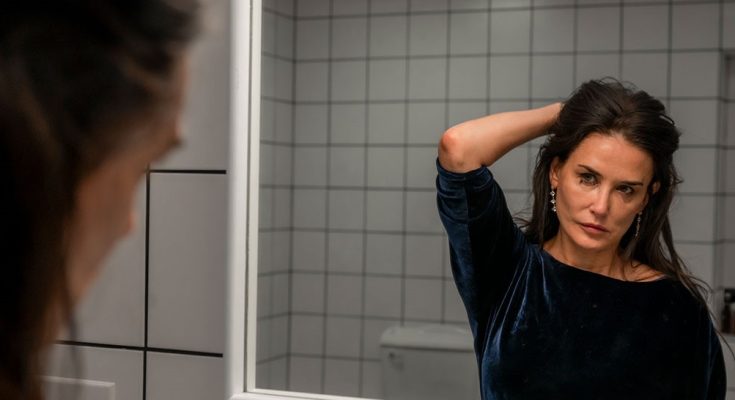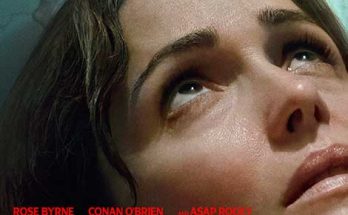#Toronto, #TIFF, #TIFF2024, #TheSubstance; #CoralieFargeat; #BodyHorrorSatire, #DemiMoore
Toronto/ CMEDIA: The award-winning body-horror satire from writer-director Coralie Fargeat, TIFF 2024 film, ‘The Substance’ portrays Elisabeth Sparkle (played by Demi Moore), a Hollywood star with her declining beauty struggling with the manifestation of her younger self Sue (Margaret Qualley).
Desperate to secure her fading celebrity status, Demi Moore undergoes a black-market medical procedure that promises self-discovery but instead results in the procreation of Sue, a self-assertive clone of her younger self.
Asha Bajaj, IBNS-CMEDIA correspondent on the sidelines of TIFF 2024 in conversation with Coralie Fargeat’s examination and exploration of society’s obsession with youth and beauty.
The excerpts of the conversation:
To Coralie Fargeat : What motivated you to write this film?
I hardly know a woman who doesn’t have a troubled relationship with her body, and had not at some point of her life an eating disorder, and violently hated her body and herself because she didn’t look the way society told her to look. When I was about to turn 40, I started to feel very depressed because I thought this was the end of my life. I felt that I won’t be able to please anyone, or to be valued, loved, noticed, or interesting. I was absolutely convinced that past a certain age, I was going to be worth nothing. The exact same way that, when I was younger. I was absolutely convinced that if I was not thin and with a perfect body, I was worth nothing So I decided to write this film.
As a filmmaker how did you confront political and personal matters through the lens of entertainment, fun, and excess?
I studied political science; I am a feminist. To confront this I feel we should be done with this shit. Although genre films are political, for me as a filmmaker, they are a great way to confront. I want to free my inner monster cast society that made me think I was a monster. Being a woman, I was taught to hide this aging part of myself. That is the reason I’m coming to you with this story today.
Can you elaborate on the theme of the film and its message?
The film is about playing with the destruction of women’s bodies to break free of those constraints that have held women for so long. We’ve been told for so long to control and hold back. So I decided that the women should do the exact opposite. Bodies here are going to be tyrannized, ridiculed, destroyed, the same way society destroys women with all the rules that we are silently taught to follow. This movie is going to be bloody gory, but also funny at the same time. I don’t know any stronger weapon than satire to show the world the absurdity of its own rules. This movie is about: A liberation. and Empowerment. Most importantly I believe it’s going to be timely.
This has been a long road to make this film and years ago you were here with Revenge, a movie that was about externalized violence against women. Can you talk about what inspired you to tackle this subject matter and explore this story?
Basically after the movie ‘Revenge’ I felt strong enough to explore the next level which is the deeper inside level. I also was starting to feel that I was going to be erased, going to disappear and I felt I really wanted to make things different. We should try and free ourselves from all this pressure that leads to what you see on screen. I wanted to express all the violence that I felt inside with a Take It Outside gesture and cathartic.
Can you comment on your writing style Coralle? In Revenge there was very little dialogue.
Basically it is the way I followed from the start. I write my scripts at the same time I write the story the way I’m going to direct and the way I’m going to create all the visuals and all the sound. The sound is really part of the experience of creating visual elements that expressed that violence to me. I wanted to write it on the paper because it was also part of the way I was going to present the script and bring the two characters and me and Margaret into the world.
Q: Tell me about the use of violence and Gore and particularly from a female perspective?
I think genre films and movies tend to be very gendered. When I grew up as a little girl those kinds of movies were for the guys to watch. When I was watching those movies I felt I was entering a world not supposed to and felt super exciting. When I was little, boys were allowed to do so much more stuff than a girl was allowed. I grew up like that with the idea of being feminine to smile to be delicate and gentle. When I grew up I felt gendered movies were really a way to free myself from those categories and to be able to totally express myself the way I felt. The idea of getting the violence on screen was for me really to express what the violence does to us and I wanted to do it in a very non subtle way because the world is still not subtle regarding this. The movie is very much about how society thinks of it, but I felt the movie is still very much centered towards the male gaze and our social organization is based around that.
The movie explores questions about the parable of Fame? And once you get a taste then it becomes hard to leave it behind. Can you elaborate on this?
I decided to have this character when I started to write. Being an actress I thought it was the best way to represent all the women in the heightened version of you feeling that we need to be seen to be loved. As an actor who puts herself vulnerable looking for love through the eye of people this is embarrassing. I think it’s interesting too in the film when Demi becomes Sue and Sue manifests.
I just wondered how much you actually have to redo things. The direction of the men in the movie in particular is very heightened and seem like caricatures.
Unfortunately I don’t think they are caricatures. These are guys that really existed, and still exist. I was amazed during the postproduction of the film when we started to show the film to a few people. The shrimp scene made the guys feel uncomfortable. But actually I was fascinated by the power of the shrimp as a violent weapon for real and I hope you make men uncomfortable for a very long time.
When you read that script, what were you most excited to do in making this film? What scene or sequence filled you with trepidation?
For me trepidation was in every scene, as I was really nervous about the dancing. This was the hardest thing for me to do. Although I am a dancer, I don’t like that kind of dancing. I tried really hard. The prosthetic work in this film is exceptional all the way to the climax with the monster. I wondered who was in the suit at the end. Margaret just said to me backstage that it was me. I think I need therapy for sure, as monsters are really a kind of liberation.
The movie is all about how it is to feel monstrous and the look you put on yourself that makes you feel like you’re a monster in the world. And being able to create this real monstrousness is the first moment where I actually love myself. I looked at myself with tenderness and love and it’s the moment where I feel okay to go outside and want people to look at me. It was one of the most difficult things to create because it was like creating a new being no one was really knowing until we did it. It’s also a part of tenderness and love that I put in the movie because the movie is just about seeking for love.
Q: How many hours did it take to put on the makeup and the prosthetic work. How long did you have it on?
Depending on how much I had on it was anywhere from six to nine hours of just the makeup and then just whatever few hours we had left to shoot. Also because it’s very delicate once you start shooting with it, it can start to disintegrate. I had to really to cook at one point too. it’s part of it, I mean it’s definitely a much easier read on.
(By Asha Bajaj)





